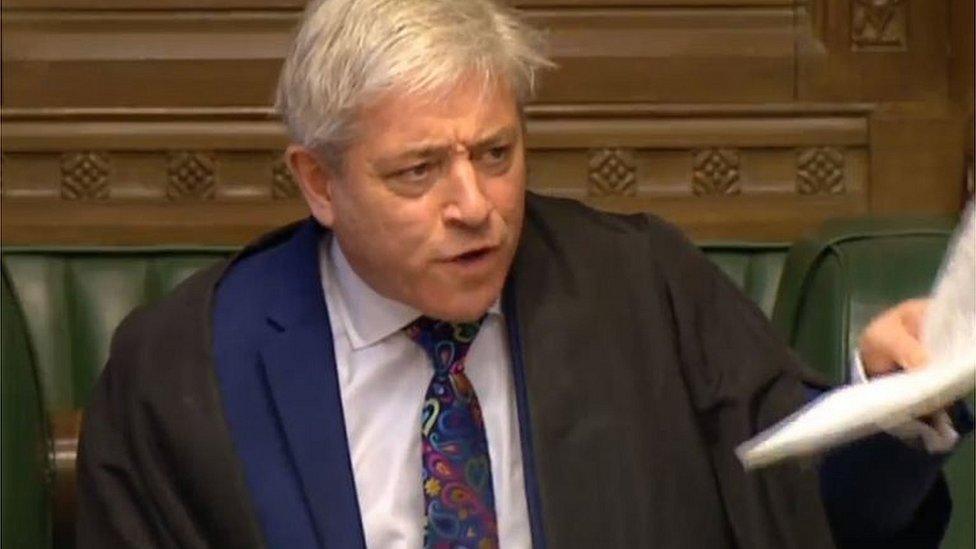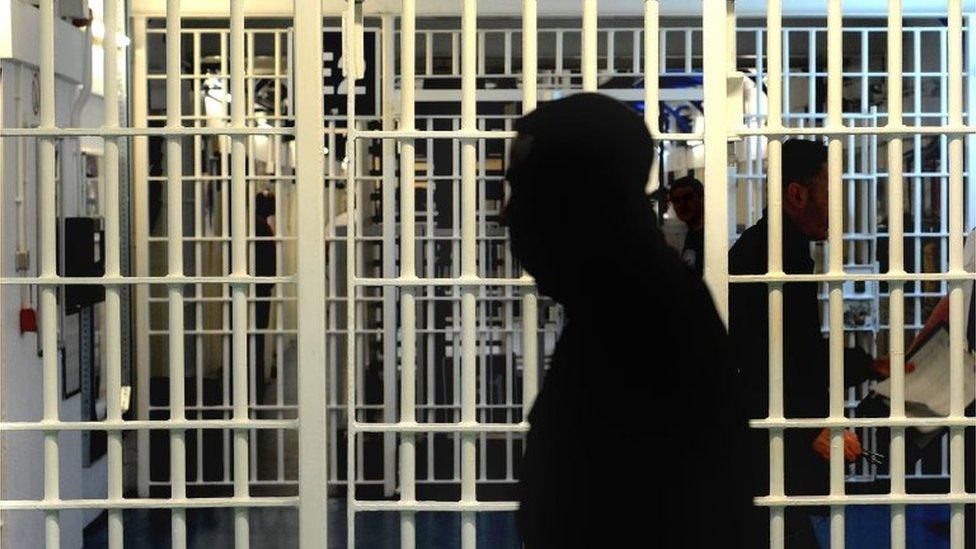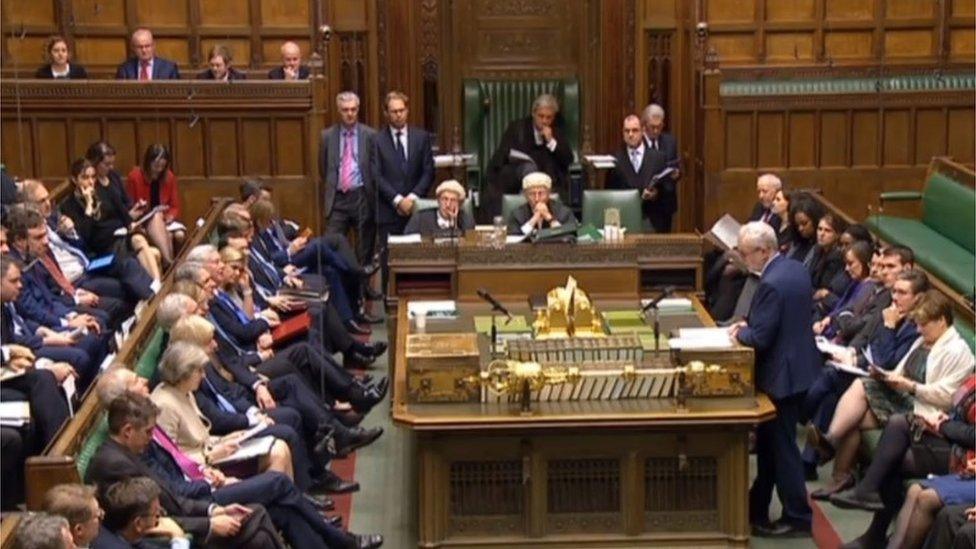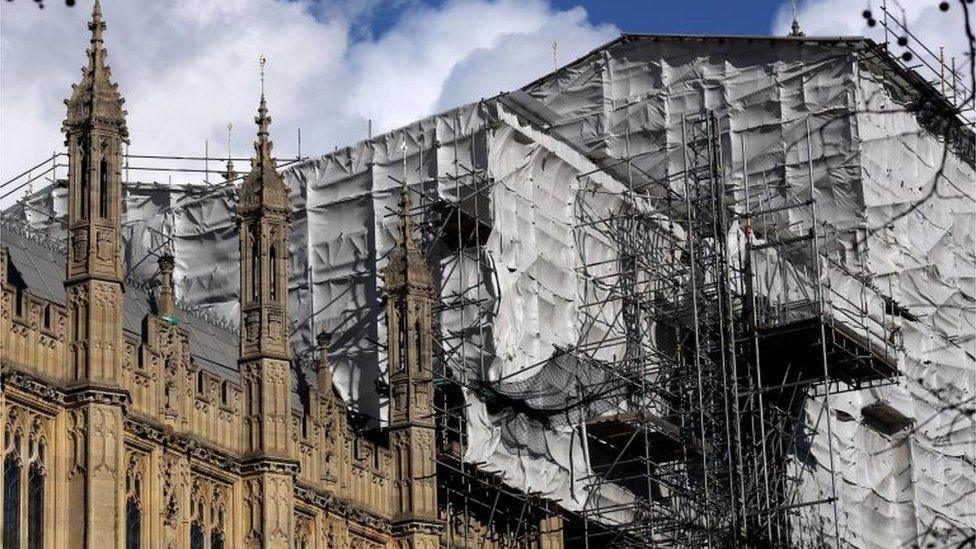Week ahead in Parliament
- Published
- comments

After the sound and fury of the Brexit Bill, the Westminster agenda seems rather more quiet in the coming week, with much of the most significant action taking place on the committee corridor.
The exception may come on Wednesday, when the Lib Dem Leader, Tim Farron, takes the unusual step for a party boss, of presenting a 10-minute rule bill calling for a referendum on the terms of the UK's divorce deal with the EU....
It does not, or course, stand a prayer of becoming law, both because 10-minute rule bills hardly ever do, and because there is virtually no support in the Commons for the idea, and even those who do want a second referendum may balk at backing a bill from the Lib Dems.
But beyond that, just imagine the scene, with the staunchly pro-Leave DUP behind him, and Labour MPs, increasingly infuriated by the way the Libs are seeking to outflank them as the party of Remain, to his right, this could very quickly turn into something resembling parliamentary bear-baiting, even before the Conservatives get involved.
And it might be quite a test for the not noticeably Farron-friendly Speaker, as well. So will we see a masterpiece of pro-Remain performance art, or something rather messy? Parental Advisory; may contain scenes of disorder and bad language.
Watch out for responses to the Scottish Parliament's decision on whether it wants to hold a second independence referendum.
Elsewhere there's a lot of finishing-off on not very controversial bills - with the biggest contested legislation probably the Digital Economy Bill, where there are a number of major issues in play - including new "fit and proper person" tests for the individuals running companies involved in media mergers and acquisitions, and the creation of new offences around online ticket-touting.
Here's my rundown of the coming week:
Monday
The Commons opens (2.30pm) with Education questions - and any post-weekend urgent questions or ministerial statements will normally follow at 3.30pm.

The Prison and Courts Bill will look at strengthening safety and security inside jails
The main debate is on the second reading of the Prisons and Courts Bill , external- which aims to reform the prison system, strengthening safety and security, improving efficiency and services for users in courts and tribunals, and reforming the claims process for minor whiplash injuries resulting from road traffic accidents. It also provides for greater use of mobile phone blocking technology in prisons.
In Westminster Hall (4.30pm) MPs debate e-petition 166847, external, which complains that insurance companies are making it harder and harder for people aged 18 to 25 years of age to start driving. Premiums for first year drivers can be £2,500 or more - completely unaffordable for many. The petition has attracted 185,175 signatures.
On the committee corridor, Public Accounts has a headline grabbing session (3.30pm) on ambulance services - they will quiz Department of Health Permanent Secretary Chris Wormald about evidence that half a million hours of ambulance time are wasted every year, as ambulances queue outside Accident and Emergency departments.
There's also a ground-breaking meeting of the Scottish Affairs Committee (1.15pm) in what is effectively a joint session with the Scottish Parliament's Social Security Committee, to look at the impact of devolving control of disability benefits to Holyrood.
In theory the MSPs will be witnesses, but they will be sitting around the same table as MPs and quizzing witnesses. This could become the template for more joint working between parliaments.
In the Lords (2.30pm), peers will be have their second day of report stage debate on the detail of the Digital Economy Bill,, external where peers will consider clauses dealing with online pornography and age verification (including calls to ensure that data used for age verification to be kept confidential), social media abuse, Ofcom, the BBC licence fee (new clause from Lib Dem super-lawyer Lord Lester would require the PM, and all ministers and agencies to protect the independence of the BBC and reserve the licence fee exclusively for the BBC).
Another new clause (32A) calls for the creation of an independent BBC Licence Fee Commission to recommend what the charge should be.
Watch out for New Clause 33ZG which aims to ensure the main public service broadcasters - BBC1, BBC2, ITV1, Channel 4 and Five - are at the top of channel listings or Electronic Programme Guides on all TV platforms. On the new Sky box (Sky Q) the default when you turn your TV on is not live TV but the 'Top Picks' of recent programmes chosen by Sky.
Tuesday
The Commons day begins (11.30am) with Health questions.
The day's Ten Minute Rule Bill is from Labour's Karen Buck - who wants to require householders to notify local authorities of an intention to register accommodation for short or holiday lets. She's concerned about the impact of letting through sites like Airbnb - you can let for 90 days, but many people are doing far more than that, and such letting a can breach mortgage agreements and insurance terms - and there's a huge emerging problem about it invalidating the insurance for commonhold properties.
Other issues include controlling anti-social behaviour and tax evasion. Councils are having to monitor websites to keep track of letting levels on their patch and enforce the law...
MPs then dispatch the report and third reading of the Intellectual Property (Unjustified Threats) Bill, external which deals with the problems of threats to sue for infringement being abused, to stifle new ideas and competition. This is an uncontroversial technical measure - and should be waved through with minimal debate. After that MPs will have a general debate on fuel poverty.
The adjournment debate, led by the Conservative Will Quince, is on public health guidance and baby loss - he has spoken in the Commons about his experience of having his son stillborn.
In Westminster Hall, debates include the relationship between the DVLA and private car parking companies - Kevin Foster (9.30am-11am); the 60th anniversary of the Treaty of Rome - Stephen Gethins (11am-11.30am); the UN international day for the elimination of racial discrimination - Dawn Butler (2.30pm-4pm); pensions in the nuclear decommissioning industry - Patricia Gibson (4pm-4.30pm) and Stoke on Trent, City of Culture 2021 - Ruth Smeeth (4.30pm-5.30pm).
My committee pick is the Home Affairs hearing (2.15pm) on hate crime and its violent consequences, where the witnesses are all MPs: Lindsay Hoyle, the Deputy Speaker in charge of MP security, Home Office Minister Sarah Newton and the Solicitor-General Robert Buckland.
In the Lords (2.30pm) the main event is a government debate on the current challenges to the international rules-based order; the preparedness of the UK's armed forces and that of Nato; and the levers available to HMG to promote the country's defence and security interests.
This debate and a Statutory Instrument approval motion on the Armed Forces Act 2017, to maintain parliamentary approval for the armed forces, will be taken together. These are followed by a short debate on the EU Committee's report on Brexit - Gibraltar.
Wednesday
The Commons meets at 11.30am for Cabinet Office and Chancellor of the Duchy of Lancaster Questions, followed, at noon by Prime Minister's Questions.

What will Jeremy Corbyn choose for his questions this week?
There will then be some brief formalities as the Labour MP and former Chair of the Home Affairs Committee, Keith Vaz, presents a bill to increase the minimum custodial sentence on conviction for possession of a knife or other offensive weapon for an offender aged 18 years or over and to increase the minimum period of a detention and training order for a person aged 16 or 17; to set a minimum custodial sentence on conviction for an offender in possession of a knife or other weapon and intending to commit any offence or having such a weapon available to use in committing murder. He won't make a speech - but the title of the bill will be read out....
Then comes what could turn out to be a very lively event indeed; Tim Farron will present a Ten Minute Rule Bill for a second EU referendum "on the proposed terms for the United Kingdom to leave the European Union" (see above).
The day's main legislating is on the Pension Schemes Bill, external, which deals with the regulation of master trust pension schemes - a popular option under the new auto-enrolment system. MPs are expected to polish off the report and third reading stages of debate fairly rapidly.... and they will then move on to a general debate on exiting the European Union and global trade.
In Westminster Hall, the subjects for debate include Iran's influence in the Middle East (9.30am -11am) and the roll-out of universal credit (2.30pm-4pm) - Newcastle MP Catherine McKinnell says her constituency office has been "overwhelmed" with casework relating to the problems around the 'Full Service' Universal Credit
My committee pick is the Work and Pensions hearing (9.30am) on self-employment and the gig economy, with evidence from experts and think-tanks. This picks up on the Budget controversy around National Insurance for the self-employed.
In the Lords (3pm) there are some amendments down for the third reading debate on the Higher Education and Research Bill, external , where the government has suffered a series of defeats at report stage, but they all come from the government spokesman, Lord Younger of Leckie, so they will be technical tidying-up or to meet assurances given during earlier stages of debate.
Then comes the final half-day of report stage consideration on the Digital Economy Bill, where more significant issues will be up for debate, including the rules on the "Crown Jewels" listed sports events, the suddenly topical subject of media mergers - watch out for a new clause proposed by Labour's Lord Puttnam and the Conservative former cabinet minister Lord Lansley, which would require Ofcom to impose a "fit and proper persons" test for individuals involved in mergers of broadcasting and media enterprises.
This would include looking at the "extent of any criminal wrongdoing that has taken place by companies and other organisations under their control; and the extent of any failures of corporate governance and management in such companies and organisations".
Peers will also look at new laws on ticket touting, including outlawing "bots" which buy up tickets online before fans can buy them - a practice which makes it difficult for ordinary folk to buy tickets without paying a considerable mark-up to online ticket touts.
Thursday
The Commons opens (9.30am) with International Trade questions followed by Women and Equalities questions, and the weekly Business Statement setting out the future agenda for the Commons. It's also the last chance for the Leader of the House, David Lidington, to keep his promise to hold a debate on moving parliament out of its Victorian home before Easter.

Will David Lidington announce the date of a debate on moving out of Parliament?
Then the Conservative Bob Blackman leads a debate on the compensation due to Equitable Life policy holders in the light of the Parliamentary Ombudsman's ruling that the collapsed company had not been properly regulated. The motion calls on the government to make a commitment to provide "full compensation to victims of the scandal as the economy continues to recover".
The day's second backbench debate, led by an interesting alliance of the former deputy prime minister, Nick Clegg; the former education secretary Nicky Morgan, and Labour's Lucy Powell, a former shadow education secretary, on the annual State of the Nation report from the Social Mobility Commission. The motion highlights the Commission's warning that social mobility is getting worse, and calls on the government to lead a renewed approach in the early years, in education, skills and housing, to improve social mobility.
In Westminster Hall (1.30pm) there are debates on two select committee reports - on the Syrian refugee crisis, from the International Development Committee, and on DfID's programme in Nigeria, from the International Development Committee.
In the Lords (11am) peers debate the report from the Science and Technology Committee, A time for boldness: EU membership and UK science after the referendum, external. And then the report from the EU Committee: Brexit: environment and climate change, external.
Friday
The Commons sits (9.30am) for its final day on the current crop of private members' bills.
And while the agenda lists an impressive number of bills for debate, in practice only the first few will be considered.
The ones with top priority are the bills which have cleared their committee stage consideration, starting with the Conservative Wendy Morton's pretty uncontroversial Local Audit (Public Access to Documents) Bill, which extends public access to certain local council audit documents.
"I am ever the optimist for PMBs on sitting Fridays," she told me. If her bill is rubber stamped through its report stage and third reading, fairly rapidly, MPs will move on to the Merchant Shipping (Homosexual Conduct) Bill, a tidying-up measure to remove obsolete offences from the statute book, proposed by the Conservative John Glen.
On its last appearance, it was denied formal approval without debate, after a Conservative colleague, Chris Chope, objected to it because MPs had not discussed the amendment which would make the bill retrospective. Mr Glen hopes to get the bill through, unamended, with the backing of the government and Labour, and if he does, another Conservative, Kevin Hollinrake, might have time to get his Guardianship (Missing Persons) Bill through third reading, too.
A long list of bills lurks further down the agenda - but they have no chance of being debated, and will be ritually pole-axed at the end of the day's proceedings.
Although some may well be re-incarnated in the next parliamentary year's private members' bill process, which will get underway when the lucky winners of a bloc of debating time are announced, at some point in June.